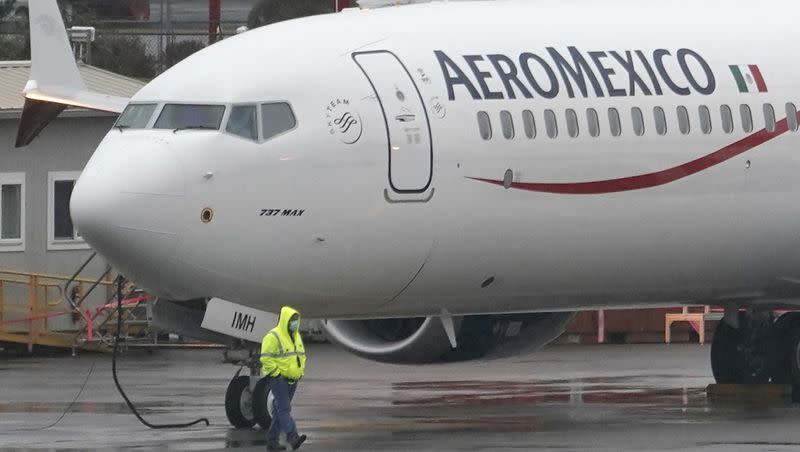Gov. Spencer Cox announces strategic trade partnership with Mexico

- Oops!Something went wrong.Please try again later.
Utah Gov. Spencer Cox presented a new strategic partnership plan to Mexican authorities on Wednesday that aims to strengthen business and cultural ties between Mexico and Utah.
The strategy was unveiled during the governor’s second trade mission to Mexico in two years. It contains 12 recommendations for partnership opportunities relating to job creation, trade, tourism and language acquisition.
“Our relationship with Mexico is the most important international alliance Utah has,” Cox said in a statement Wednesday. “We have long enjoyed economic and diplomatic connections that have been mutually beneficial and this plan will only strengthen our ties.”
This week, Cox and other Utah government officials and business leaders, including World Trade Center Utah CEO Jonathan Freedman, met with the country’s secretaries of economy, tourism and foreign affairs, as well as executives from Aeroméxico.
The trip highlighted the unique economic relationship between Utah and Mexico and was well-received by the delegation’s Mexican counterparts.
“We celebrate this type of initiative,” Mexico Foreign Minister Alicia Bárcena said in a statement. “It’s important that we make the most of the excellent state of Mexico-U.S. relations to deepen our economic ties and build together a true binational and regional community that increases trade, social inclusion and job creation.”
Why is Gov. Cox in Mexico?
Speaking from Mexico City, Freedman explained the goals of the trade mission, which was organized by the Governor’s Office of Economic Opportunity, in concert with the Mexican Consulate in Salt Lake City and World Trade Center Utah, a nonprofit that handles trade promotion on behalf of the state and helps Utah companies grow internationally.
“We’re invested in Mexico. And we’re here to strengthen ties, to build relationships, to build on momentum, and we’re finding that our Mexican counterparts feel the exact same way,” Freedman said in an interview with the Deseret News.
Freedman said the delegation’s schedule was packed with meetings with government officials in the country’s capital as well as industry leaders in Monterrey, which Freedman called the manufacturing capital of Mexico. The goal of the trip is to open up markets for Utah companies by better understanding the political and economic “landscape” in the Latin American country as offshoring to some Asian countries becomes more difficult.
“There’s a concerted effort, and there has been for some time, to diversify out of China,” Freedman said. “There’s a highly skilled and affordable labor market in Mexico. It’s a friendly nation to us. It’s an ally. There are lots of reasons to diversify into Mexico and I think that any company should consider a diversified supply chain.”
Mexico is Utah’s largest import market and third largest export market, according to the U.S. Trade Census, with imports topping $4.5 billion in 2022 and exports exceeding $1 billion, a 50% increase from 2018.
This trade supports 51,000 Utah jobs, totaling $5.6 billion in 2022, according to Mexico’s secretary of exterior relations.
What did the governor’s trade mission accomplish?
On Tuesday, Cox met with executives from Delta and Aeroméxico and celebrated two new flights from Salt Lake City to Mexico City and Monterrey.
Freedman said that discussions with officials at the U.S. embassy touched on the current state of immigration at the southern border but said conversations with Mexican leaders were never political.
“All of our business meetings have been in the spirit of partnership and working together,” Freedman said.
A specific topic of discussion was how Utah’s supplement industry, which is one of the biggest exporters to Mexico, has been disrupted by inconsistent regulatory practices from Mexico’s equivalent to the FDA.
“These inspections can take months. And it’s very disruptive to company supply chains,” Freedman said.
The plan presented by Utah’s governor to Mexican authorities included 12 specific recommendations to improve the relationship between the two regions. They range from organizing business events for industries dependent on Utah-Mexico trade and creating pathways for Mexican professionals to gain work experience in specific sectors in the U.S. to promoting Mexican cultural festivals and encouraging the state’s institutions of learning to add or expand language programs.
According to the Governor’s Office of Economic Opportunity there are nearly 340,000 Mexicans and people of Mexican descent in Utah. This is roughly 10% of the state’s population, including 20% of Salt Lake County, making the group the state’s second largest ethnic population, according to the Kem C. Gardner Policy Institute.
The Deseret News reached out to the Governor’s Office of Economic Opportunity for this story but did not receive a comment before publication.
Who else was on the Mexican trade mission?
There were 17 businesses represented on the trade mission, Freedman said. They include: IsoTalent, Angel Studios, Boom A.I., Dorsey & Whitney LLP, Dustless Technologies, H-11 Digital Forensics, Homie Real Estate, KPMG, Lion Energy, Malouf Companies, nClouds, OneMeta AI, RevRoad Capital, San Diablo Artisan Churros, SnugZ USA, SynergySuite, TETON Sports, Traeger Grills and Ultradent.
State Sens. Mike McKell and Luz Escamilla, State Rep. A. Cory Maloy, and representatives from Utah’s office of tourism were also there.
Contributing: Suzanne Bates

